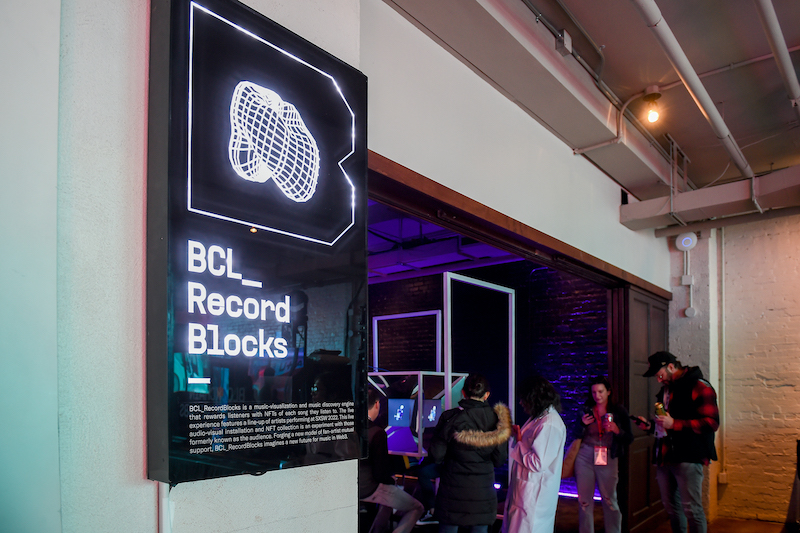South by Southwest — commonly referred to as “South By” or “SXSW” — has returned to Austin, Texas this year to showcase the latest trends in interactive media, music, art, film and technology. While SXSW runs through March 20, 2022, the entertainment and technology festival kicked off its first weekend with a large focus on Web3 and nonfungible tokens (NFTs).
SXSW’s attendees’ interest in NFTs and the future of the internet was particularly evident at the venue hosted by Blockchain Creative Labs (BCL) — a business and creative unit formed by FOX Entertainment in 2021. On March 11, the first day of SXSW, a line consisting of hundreds of people wrapped around the streets of Fifth and Trinity in downtown Austin as SXSW badge holders anxiously awaited entrance to BCL’s interactive NFT venue that also showcased Web3-focused panels.

BCL CEO Scott Greenberg told Cointelegraph that the company was the exclusive blockchain sponsor of SXSW this year:
“SXSW is a place for independent musicians, filmmakers and content creators to come together to find a way to foster business entertainment innovation. Given this, Blockchain Creative Labs felt that SXSW was the perfect place to come and tell a story while serving as a center for activation.”
Indeed, BCL’s event space appeared to be one of the most widely attended SXSW spots, especially for those interested in nonfungible tokens. The venue, which was open through Sunday, March 13, included a gallery of NFTs created by leading content creators, exclusive NFT drops of music from official SXSW artists, NFTs from feature films premiering during the festival, along with a number of thought leadership sessions on Web3 development. “We had over 60 speakers and 40 panels on Web3, entertainment and how this provides new value to creators. SXSW 2022 was really about NFTs and the Metaverse, and our goal was to educate attendees. I think we achieved this,” said Greenberg.
Greenberg said that BCL’s SXSW activation space consisted of interactive rooms to provide attendees with hands-on educational experiences to learn about the decentralized internet, also known as “Web3.” For example, BCL allowed festival-goers to create proof-of-attendance-protocols (POAPs) to document their attendance at SXSW. BCL’s POAPs served as NFT badges given to attendees of both virtual and in-person events that took place during the first weekend of South By.
The venue also featured a “BCL_RecordBlocks” station, which enabled attendees to “listen and earn” music NFTs from over 30 musicians. “The concept here was to let attendees choose from over 100 songs to listen to. After listening, a QR-code would appear on the screen in front of them that could be scanned for a music NFT,” explained Greenberg.
He said that the exhibit let attendees better understand how to obtain music NFTs while also enabling individuals to connect directly with the musicians featured. “In gaming, you have play-to-earn. This is listen-to-earn to show how we can connect artists and fans together using NFTs,” said Greenberg. Given that the Web3 space is still developing, BCL had staff members in white lab coats managing the exhibit to help onboard users to MetaMask, Coinbase or Rainbow wallets where they could then store their NFTs.

The BCL venue also featured an “SXSW x BCL NFT Ledger” room which showcased a visualization of all SXSW-related data being recorded in real-time. “This exhibit featured Polygon wallet addresses from people claiming our free NFTs like Record Blocks. Everything displayed comes from the BCL marketplace,” explained Greenberg. He said that data will be recorded during the entirety of SXSW and will then be minted into an NFT. Greenberg said:
“This serves as a time capsule of SXSW events. Data is updated on a regular basis to visually show how information is recorded on the Polygon blockchain. This is also an art exhibit, as we will mint this as a 1-on-1 NFT that we may eventually sell.”

NFTs were also widely discussed at “The AlgoRanch,” a pop-up event hosted by Algorand, a blockchain network designed to solve security, scalability and decentralization issues. Algorand has also taken an interest in NFTs, specifically when it comes to ensuring sustainability since the network uses a Pure proof-of-stake (PoS) consensus protocol.
In order to demonstrate recent NFT innovation, Algorand featured a number of sessions during its SXSW pop-up focused on nonfungible token projects. For instance, Shrina Kurani — a Democrat running for Congress in California’s 41st District — appeared on a panel to shed insight on the launch of her NFT collection. Known as “Kurani for Congr3ss,” she explained that this is a collection of 230 NFTs designed to raise awareness for her campaign while highlighting climate-friendly solutions in the Web3 space.
In order to detail the importance of her NFT collection being carbon neutral, Kurani was on stage alongside Priya Samant, CEO of Abris — a sustainable NFT marketplace built on Alogrand that partnered with Kurani on this particular drop. “The main collection featured 230 NFTs that represent the 230 billion tons of carbon remain in the world‘s ‘carbon budget,’” explained Kurani.
Kurani further told Cointelegraph that she is the first-ever federal candidate to launch NFTs for a congressional campaign:
“We are leveraging NFTs as a way to support a campaign to make a real impact on the future. It’s important to be connected to both Web3 and the real world to bridge the gap between politics and crypto — NFTs are a way of doing this.”
Kurani added that NFTs allow congressional candidates to represent the American population, claiming that 3 out of 10 Americans under the age of 30 engage with cryptocurrency. “This is a way to get those individuals involved. We can also reach more people and educate the population on financial literacy. The main thesis of Web3 is about decentralization, consumer empowerment and ownership, which is why we are excited about NFTs,” she remarked.
In addition to Kurani’s NFT collection, the American Rapper Darryl McDaniels also known as “DMC,” announced the tokenization of his song Million Scars at Algorand’s SXSW pop-up event. For this launch, McDaniels used Stoi.org, a technology platform built on the Algorand blockchain that features a carbon-neutral footprint and low transaction costs. McDaniels told Cointelegraph that blockchain technology allows musicians to solve common problems in the music industry:
“Run DMC has always brought people together for the better. What I’m doing with Algorand will help us manifest solutions needed to put power back into the creator‘s hands. Everything in the music industry has been exploited and separated, and now we have solutions to make it inclusive for everyone involved.”
The Ripple House, hosted by fintech firm Ripple, also featured a variety of NFT projects to highlight the company’s new Creator Fund. Monica Long, general manager of RippleX — Ripple’s innovation arm — told Cointelegraph that the fund is a $250 million commitment to help creators with their NFT projects:
“While creators are starting to understand the benefits of NFTs, they typically don’t know how to go about developing these projects. They either lack funding or marketing and technical expertise, so we wanted to launch the Creator Fund to solve these three challenges. We’ve already had over 4,000 applications, most from independent creators looking to grow their audiences.”
According to Long, Ripple’s Creator Fund examines a variety of NFT use cases, but the company plans to focus primarily on sustainability, real estate, music and entertainment moving forward. Long added that developers can currently experiment with NFT functionality on the XRP Ledger using NFT-Devnet, a beta environment for developers to use XLS-20d — the native NFT standard RippleX is proposing.
“We are working on a new standard to make the NFT minting, management and burning experience more natively built into the protocol. Other chains have NFTs programmed through smart contracts, so a lot of these capabilities are now built into the XLS-20d standard,” said Long. The executive added that Ripple anticipates the standard to go up for mainnet amendment voting in early April.
In the meantime, some were already demonstrating how the XRP Ledger could be used for NFTs. Kaj Leroy, co-founder and CEO of Xpunks — an NFT project built on the XRP Ledger — gave a glimpse into the project by creating custom JPG avatars for attendees. Leroy told Cointelegraph that Xpunks is currently waiting for the XLS-20d standard to be released before minting the actual Xpunk NFTs. “These are just JPGs now, but once XLS-20d launches we will make a big collage of all these JPGs, mint it, then send it to everyone who came to our booth at SXSW.”

Stellar also jumped on the opportunity to showcase NFT development during SXSW this year. The open-source decentralized protocol hosted a 48-hour NFT hackathon during the first weekend of South By, bringi newcomers and experienced developers together to build a project on the Stellar network that incorporates nonfungible tokens.
According to the prompt, artists were instructed to create NFT artwork that “embodies the metaverse.” Stellar then sent XLM funds to users’ Litemint wallet addresses to cover the minting fees. Participants had the opportunity to win $1,500 worth of XLM prizes for participating in the challenge.
Another major topic of conversation during SXSW this year was Web3 and the rise of the Metaverse. Some of the most in-depth conversations regarding metaverse development took place at Fluf World’s Fluf Haus.
Alex Smeele, co-founder and CEO of Non-Fungible Labs and Metaverse environment Fluf World, told Cointelegraph that the company wanted to use SXSW as an opportunity to discuss plans for the launch of its “Metaverse Manifesto.”

While there are a number of different definitions for the Metaverse, Smeele explained that he believes it represents the future of the internet and how people will engage with it. As such, Smeele noted that the Metaverse requires standards that Web3 companies must address:
“The Metaverse Manifesto is a call to arms for industry leaders to address the wider issues we are facing. Everyone is charging headfirst into this space with big ideas, but there are still questions that need to be answered if we are going to drive things forward correctly. If we can bring the smartest people in the industry together to define these standards, it will save hassle moving forward.”
Smeele said that the sessions hosted at Fluf Haus focused on sustainability, inclusion, diversity and other topics shaping the Metaverse. “We had about seven ecosystem partners present to discuss these topics. Altered State Machine, Carbon Click, The Seekers, Silo team and a number of others came together to address important issues. Decentralization is about putting power back in the hands of individuals, but with great power comes great responsibility,” commented Smeele.

Although it’s notable that NFTs and Web3 were major topics of discussion during SXSW 2022, cryptocurrency and Bitcoin (BTC) were largely left out of the conversation. Dan Held, growth lead at Kraken and a serial Bitcoin entrepreneur, highlighted this point in his recent recap of SXSW. In his post, Held noted:
“On Sunday morning at 10AM, I was the moderator of the ONLY Bitcoin panel at the conference called ‘Bitcoin DeFi’ where I chatted alongside Pomp, Alyse Kileen, and Tony Cai about the basics of Bitcoin, DeFi, and the intersection of the two. Pretty wild to think that we were the only Bitcoin talk!”
A few pop-up events during SXSW focused on the crypto ecosystem. The Grit Daily host featured a fireside chat on March 10 with Alex Mashinsky, CEO of Celsius Network. Tal Bentov, vice president of lending at Celsius told Cointelegraph that she believes there was a genuine interest in crypto at SXSW, which is why it was important for Celsius to be one of the few crypto companies that showed up.
So, there were very few official SXSW panels related to cryptocurrency. One of the panels that did discuss crypto in-depth was entitled Financial Surveillance in a Cashless Society. Sheila Warren, head of data, blockchain and digital assets at the World Economic Forum, was one of the panelists for this session.
Warren told Cointelegraph that the discussion focused on policy and how regulators think about central bank digital currencies versus cryptocurrency. “We didn’t necessarily conclude anything specific, but the more we go digital, the more opportunities there are for tracking and tracing. There are ways to mitigate the ability for private and public sectors to track what you are up to online, though,” said Warren.
She added that an impressive number of SXSW attendees were present for this panel, demonstrating how important this topic is for many people, along with those who work in policymaking. Warren further remarked that while she thinks NFTs are the gateway into crypto, she hopes that South By attendees realize that a lot more is happening within the crypto ecosystem aside from NFTs:
“There is a lot going on in the ecosystem and, now, the industry is getting taken seriously by many different people all over the world. I’m happy to see this activity and that people are realizing it can be a fun technology, but it’s also serious and life-changing. I hope next year at SXSW we get more opportunities for discussion within the crypto world as a whole.”
Copyright © 2021-2025 AssessCrypto All rights reserved.